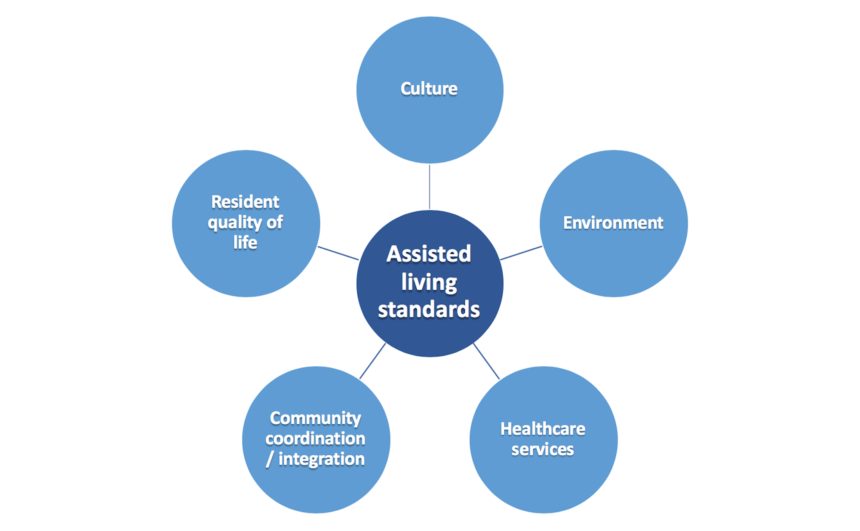
Real estate investment trust Welltower has enlisted a group of senior living operators, academics, industry representatives and adult children of residents to develop care quality standards for its assisted living and memory care community operators that could be used across the industry.
The effort comes as the Toledo, OH-based REIT hopes to position itself as “a convener and leader for the AL industry in the realm of quality of care,” according to a report released Thursday detailing the group’s initial efforts.
“As America ages, the assisted living industry will need not only to provide high quality care to older adults but will need to prove to various constituencies that it is providing high quality care,” Bruce Leff, M.D., a professor at Johns Hopkins University, Baltimore, wrote in the report. “Welltower is convinced that measuring care quality and building a culture of quality and quality improvement among its operating partners would position the assisted living industry for the future.”
Leff leads the new stakeholder group, known as the National Assisted Living Quality of Care Network, involved in the effort. Among its 12 other members are representatives of the American Seniors Housing Association, Argentum, the National Center for Assisted Living, Silverado and Sunrise Senior Living. Welltower’s portfolio includes Silverado and Sunrise communities.
A three-year effort
The report, titled “Development of the National Assisted Living Quality of Care Network and a Quality of Care Framework for Assisted Living Care,” is the result of more than three years of work that began in April 2015 when Welltower approached Johns Hopkins “seeking strategic advice on how best to lead the assisted living industry in developing national quality of care standards for assisted living and memory care communities,” Leff said.
Between that time and a stakeholder meeting in April 2018, Johns Hopkins researchers had phone calls and meetings with Welltower executives and conducted 12 stakeholder interviews.
“It was notable in the interviews that there seemed to be a clear sentiment that while AL is a social model, medical care must be present and robust but, at some level, invisible,” according to the report authors.
The group came up with five pillars that can form the basis of national quality standards in assisted living: culture, environment, healthcare services, coordination and integration with community, and resident quality of life.
“I was pleased to share NCAL and our members’ belief that quality can be improved through data collection and a consistent workforce,” Lindsay Schwartz, Ph.D., NCAL associate vice president of workforce and quality improvement, told McKnight’s Senior Living. “Each assisted living community can best set their specific metrics or standards to ensure person-centered care, but with this quality framework, we can all get there together.”
Potential next steps
Potential next steps, according to the report, include seeking feedback from additional operators and others; prioritizing the five pillars to help future efforts and help make a case for public payment options for assisted living; reviewing existing nursing home quality indicators to determine their relevance to assisted living as well as to differentiate assisted living from skilled nursing; testing care quality programs at operators in Welltower’s portfolio; and creating a “critical incident” reporting system across all Welltower portfolio communities in light of the findings of a February report by the Government Accountability Office on federal oversight of assisted living.
The GAO found that 26 of the 48 state Medicaid agencies studied could not report the number of so-called critical incidents — such as abuse, neglect or exploitation — that occurred in the assisted living communities located in their states. The investigators recommended that the Centers for Medicare & Medicaid Services establish standard Medicaid reporting requirements that all states could use to annually report information on critical incidents.
Assisted living’s increasing role
Welltower publicly announced a partnership with Johns Hopkins Medicine in February 2017 in conjunction with its fourth-quarter 2016 earnings call, indicating that two initial focus areas would be assisted living and memory care.
“It is well-known that healthcare delivery is transitioning from an acute-care, hospital-focused model to broader outpatient, sub-acute, post-acute and senior care networks that can deliver better outcomes at lower costs,” Welltower CEO Tom DeRosa said at the time. “For this transition to be successful, real estate needs to have a seat at the table.”
Welltower plans to partner with additional major academic and regional health systems across the United States, DeRosa said.
“As they invest in building more advanced and robust outpatient networks, we intend to be their partner and connect our leading senior, dementia and post-acute care platforms to these systems to help them better manage their patient populations and provide them with a competitive advantage to grow market share and profitability across the healthcare delivery continuum,” he said.
More recently, in July, DeRosa reiterated his belief that assisted living may become “more consequential” in the health system.



